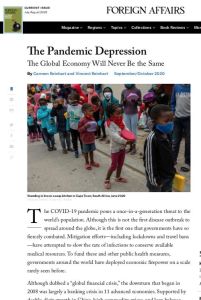Join getAbstract to access the summary!

Join getAbstract to access the summary!
Carmen Reinhart and Vincent Reinhart
The Pandemic Depression
The Global Economy Will Never Be the Same
Foreign Affairs, 2020
What's inside?
The coronavirus is altering social, economic and geopolitical landscapes.
Recommendation
Coronavirus has turned the world upside down, ravaging economies and challenging fiscal and monetary officials as never before. Noted economists Carmen Reinhart and Vincent Reinhart posit that the aftermath of this global crisis will be long and hard, reshaping society’s long-held convictions and expectations. Their sobering assessment, which comes with few remedies, offers executives and analysts a steely-eyed look at what the future could hold.
Take-Aways
- COVID-19 is shrinking global economic growth precipitously.
- Recovery from the pandemic will be slow and uneven.
- Society will feel the knock-on effects of the coronavirus for years to come.
Summary
COVID-19 is shrinking global economic growth precipitously.
Global growth is down sharply; the World Bank expects a 5.2% decline in 2020. Monthly unemployment numbers in the United States are the worst they have ever been in the history of the country’s Bureau of Labor Statistics. The story is similarly grim in the United Kingdom, which suffered the steepest drop in output in more than three centuries.
““The COVID-19 pandemic poses a once-in-a-generation threat to the world’s population.” ”
The disease has left economic decline in its wake. As some areas rebound, however, policy makers should not conflate any business resurgence with an economic recovery.
Recovery from the pandemic will be slow and uneven.
Three aspects of COVID-19’s impact signal a particularly arduous road back to normal. First, export demand has slowed markedly, the result of border restrictions and lockdowns, so export-driven economies have particularly felt the heat. A decline in trade translates into export price drops, and the buckling in energy prices has been dramatic, disrupting delicate relationships in OPEC. The World Trade Organization predicts an overall reduction of 13% to 32% in global trade in 2020, a level that could rival that of globalization’s nadir in the 1930s.
““The shadow of this crisis will be long and dark – more so than those of many of the prior ones.” ”
Second, unemployment has risen sharply. The pandemic will lead some people to permanently exit the workforce, while others will miss opportunities to retrain. New graduates will experience lower wages for years to come. Third, the crisis has disproportionately affected the poor, most of whom lack savings and cannot work remotely. Many of these individuals labor in small businesses, which are more susceptible to collapse, especially because the pandemic’s consumption pullback will likely continue well past the end of any shutdown. The quality of life will decline for the people who are already the least well-off, particularly in developing countries with meager or nonexistent social insurance systems.
Society will feel the knock-on effects of the coronavirus for years to come.
Already strained government balance sheets will mean limited fiscal resources to help the needy. Mounting debt will impede countries’ efforts at restoring their economic activity. The juxtaposition of winners and losers in the economy will become sharper.
““There is no one-size-fits-all solution to these political and social problems. But one prudent course of action is to prevent the economic conditions that produced these pressures from worsening.” ”
Globalization will face increasingly strong headwinds, as many blame the pandemic on open borders. Public mistrust and nativism will rise as multilateralism declines. The longer it takes for economies to rally, the greater the risk of permanent damage to individuals’ financial prospects.
About the Authors
Carmen Reinhart is chief economist at the World Bank. Vincent Reinhart is BNY Mellon’s chief economist and macrostrategist.
This document is restricted to personal use only.




















Comment on this summary